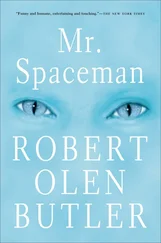None of this was in her conscious mind. Not then, not since. But the first time they made love it was certainly present in her hands and her breath and in the tremors of her and the grinding in her and in the rushing and release in her and in her sweat afterward and in the lull.
On that night, after she and Robert had sex, when she was led to ask him what he’d actually done in Vietnam, when she heard how his job had been like research, how he was in a safe place counting and assessing men and weapons, how it was so very unlike combat, after she heard these things and then showered and dressed and came back to him and sat beside him on the bed and hooked her arm in his, after all that, she lied to him. And to herself. She said, “I’m so glad.”
Not entirely a lie. Her rational mind was glad. If she was to be with this man forever, as she already felt she might, and if she believed in the righteous cause of her generation, it was better that he had not taken part in the fundamental act that makes war evil. Her mind was content with that. Even grateful.
But she had expected the answer to be different. In her body, something was let down, something had lessened. Her body feared — her body knew — that even though her love for him would grow, having sex with this man would never again be as good.
His wrist falls from his forehead.
He looks away, out through the French doors.
Darla says, “Is he giving up?”
“I don’t think so.” Robert turns to her.
“How’s your mother?”
“Wallowing in it.”
Darla holds her tongue. About both of Robert’s parents.
“I spoke with Jimmy,” he says.
Darla gapes. “What?”
“My mother found his number.”
“You actually talked with him?”
“I did.”
“Wow.”
“She loves her melodrama.”
“But you called him.”
“I did.”
“For her?”
“ He made the break permanent. Not me.”
She grunts softly in assent. “And he actually talked with you?”
“Talked. Some. It ended as you might expect.”
“He has his father in him. I can’t see him ever forgiving.”
Robert snags on this, though not about Jimmy. He masks it from Darla by turning his face away toward the veranda. He stays silent.
“You don’t think so?” she says.
He still doesn’t speak.
“I know it’s ironic,” she says.
“But true,” he says. “He’ll never forgive me for going to Vietnam.”
“And your father will always love you for it,” Darla says, overexplaining the irony to reassure him.
Robert rises abruptly, crosses to the French doors.
“You don’t need Jimmy’s forgiveness,” Darla says, thinking she’s read his gesture.
Robert turns back to her.
She cannot see his face with the afternoon sun in the trees behind him.
He braces himself to let go of his father. It’s easier to start with his brother, so he answers her, “I know that. I don’t even miss him, is the truth of it,” thinking, Nor will I miss Pops. Pops: The word belies his assertion. I won’t , he insists. But the man won’t let him go. Maybe when he’s dead. Surely when he’s dead it’ll all be over.
And Robert has another impulse. No. Not an impulse. More considered than that. When his father is dead, what is unfinished will not die with him, it will simply stay unfinished. Robert thinks: Tell him. Whatever the outcome. Go to him. Tomorrow. Tell him about the man in the dark. And tell him the truth. Tell him you can’t get over it.
Jimmy despises napping in the daytime. It is, for him, a lying down to a small death. But after Linda has made her announcement and made her suggestion and they have fallen silent, and after she has risen and bent to him and tried to kiss him lightly on lips that he will not lift to her, and after she has, instead, pecked him on the forehead and gone out of the break room and stopped at Jimmy’s worktable and put on her quilted coat and knit cap, and after she has closed the barn door behind her and, no doubt, gotten into her car and driven away to either Paul or Becca, Jimmy finds his eyes bloated with the wish to close. He lifts his feet and turns and stretches out on the sofa. Expecting sleep, he sees before him a vast expanse of meadowed snow, the tree line etched thinly at the far horizon, the sun low behind it, setting there he realizes, and he turns and turns and it is the same in all directions: He is alone; he is utterly alone. So he turns and turns and when he is once again facing the setting sun he can see something, far off, tiny still but recognizable as three figures against the snow. At first he is lifted by the sight of them, but then he knows who they are and he cannot imagine how they have come to be here, in this landscape of snow, in his Canada, but here they are, his mother and his father and his brother, and they’re coming this way. He thrashes. He sits up.
Mavis’s face is before him, her brow furrowed, her gray gaze gone sad.
She waits in silence as he squeezes his eyes shut briefly, clamps his two temples between thumb and fingers, waits for the wooziness of daytime sleep to fade. Finally he lifts his face again, looks at her.
“Are you okay?” she asks.
“Just the effects of the nap.”
“I mean otherwise,” she says.
Her manner with him over the past weeks, particularly when Linda was the seemingly routine subject between them, finally clarifies itself. “You knew,” he says.
She looks at him for a few beats, filling in the unspoken words between them. “Only guessed,” she says.
“This won’t affect any of you,” he says.
“I’m not worried about that.”
“I’m all right,” he says.
She nods, minutely, as if she’s doubtful.
“It’s an understanding,” he says.
“I don’t mean to intrude,” she says.
“Thanks.”
They stare quietly at each other for a moment.
Then he asks, “How was the stew?”
She flickers a smile. “I brought you some.”
“Good,” he says. “I’ll have enough for two nights.”
She puts her hand on his shoulder, squeezes it gently, and she goes.
He rises.
He crosses to the coffeepot, pours a cup, drinks. It’s no longer fresh. At the pay phone in Buffalo in July of 1968, after the click of disconnection from his father, Jimmy hung up the receiver, turned his back on the phone, and he looked at his watch. He didn’t need to know the time to know it was time to go. In the break room Jimmy does not consciously remember that gesture, but it and the reflex that animated it, that propelled him to the life he’s lived all the years since, is the same now: He looks at his watch. It is five minutes to one. He can be on Baldwin Street in three hours. Before the shop closes and Heather goes home. It is time to go.
Less than three hours later, Jimmy steps into his shop, the entry door’s retro brass bells jangling above him, the smell of mellowed-down leather filling him, two things that always give him a surge of pleasure, this space he has created, these things he has made. And the long drive has done him good. He quickly ceased thinking about Linda and instead revisited all of Heather’s knowing looks and admiring words, compressing them into an underlying narrative that reassures him he’s not about to make a fool of himself.
The shop is empty, including the checkout counter. He moves along the center aisle with a sudden and acute sense of Heather: In a place empty where he expected her to be, he misses her.
Then she appears in the doorway to the back room.
She’s wearing her sales-floor outfit, a jacket off the rack — today a lambskin bomber — over a black crewneck T-shirt. Black on black makes her dark eyes even darker, her skin even whiter. She brightens. His narrative falls apart. He will make a fool of himself.
Читать дальше












